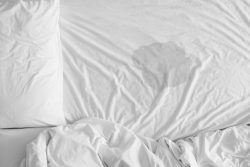Bedwetting and Sleep Apnea: Understanding the Connection
March 4, 2022
When small children wet the bed, it is usually dismissed as simply a part of growing up. When adults have the same issue, it often signifies a medical problem that requires treatment. If you occasionally wet the bed, do not let embarrassment hold you back from seeking professional help. You might be suffering from sleep apnea in Boca Raton, a serious sleep disorder that, if left unaddressed, could have far-reaching effects on your overall health. Let’s talk more about the link between bedwetting and sleep apnea and how these issues can be treated.
Bedwetting and Sleep Apnea
Obstructive sleep apnea in Boca Raton, often referred to as OSA, occurs when an individual repeatedly stops breathing throughout the night. These episodes, called apneas, are caused by tissues in the throat that interrupt the free flow of air.
At first, it may seem highly unlikely that OSA could have anything to do with bedwetting. However, one study found that around 7% of people with the sleep disorder also struggle with bedwetting. Those who do not wet the bed may suffer from nocturia (frequent nighttime urination). In fact, one survey discovered that 84% of people with sleep apnea have also experienced nocturia.
Why Does Sleep Apnea Cause Bedwetting?
Current research has not reached any firm conclusions on why OSA can increase the risk of nocturia and bedwetting. However, one theory is that OSA makes its victims so worn-out that they cannot arouse themselves at night to make the trip to the bathroom. It is also possible that OSA interferes with the hormones that regulate urinary urges and control.
Finding Help
Sadly, the correlation between nocturnal urination problems and OSA is not common knowledge. Therefore, many individuals who wet the bed may not even consider the idea that they have a sleep disorder. Rather than visiting a sleep expert, they might ask their primary care practitioner or a urologist for assistance. If such doctors do not screen patients for OSA, they could end up misdiagnosing the root cause of the bedwetting.
If you have symptoms of OSA along with bedwetting, you should visit a doctor who can help you arrange for sleep testing. Such symptoms include loud snoring, daytime exhaustion, and observed pauses in breathing. After you get tested for OSA, you can learn about your next steps. Often, patients who comply with their OSA treatment notice that many of their secondary symptoms, such as bedwetting, subside as the quality of their sleep improves.
Bedwetting is frustrating and inconvenient. If you suffer from it, you might find that sleep apnea treatment is the key to enjoying better sleep and drier nights.
Meet Dr. Mogell
Dr. Kenneth Mogell is double-board certified in dental sleep medicine. With more than 10 years of experience in helping patients to conquer OSA, he is well-qualified to recognize symptoms of the disorder, help you arrange for testing, and walk you through your treatment options, including comfortable and convenient oral appliance therapy. To learn more about Dr. Mogell and how our team may be able to serve you, reach out to any of our convenient locations or give us a call at 561-353-5252.
